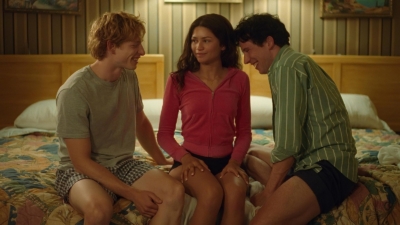
The screenplay was written by brothers Carey and Shane Van Dyke (of these Van Dykes, yes), and then rewritten by Katie Silberman. It focuses on a young couple, Alice and Jack Chambers, who live a seemingly carefree life in the town of Victory. This idyllic place looks like taken straight out of the fifties — both when it comes to its aesthetics and its way of life. The most important people of Victory are its men — they are the ones who, day by day, drive to the mysterious company which founded the town, and work on a top secret project. Meanwhile, the women are supposed to take care of their homes and refrain from asking unnecessary questions. Alice, however, is forced to articulate these questions when she begins to discover that something in the town is very wrong.
Van Dykes and Silberman have written an interesting, even if slightly derivative psychological thriller (“The Stepford Wives” come to mind as one of the obvious inspirations). So although the story is not particularly innovative, thematically it is very much up-to-date. The film’s Victory is a paradise for conservative men who dream of the old order: a world where they are the sole breadwinners and hold an important position in a top-secret company. And when they finish work, they return to their cleaned houses and have dinner prepared by their devoted wives. All these men are led by mysterious Frank — their employer, the town’s founder and its spiritual leader who’s very reminiscent of Jordan Peterson-like pseudo psychologists (as a matter of fact, according to Wilde, Frank was at least partially based on Peterson).

It’s a pity, though, that the film falls apart in its third act. When all the cards have been revealed and it’s time for the final confrontation, the filmmakers suddenly realise that there have been supporting characters who need their plot threads resolved. These resolutions are, unfortunately, rushed and not entirely thought-through. As a result, when the credits begin to roll, you’re left with the impression that the last bit of the story was too abrupt. And the director is not without her faults.
Otherwise, however, the direction is very competent. Olivia Wilde is able to capture the imagination with the grand-scale production value. Thanks to magnificent cinematography and really solid production design, the town of Victory does indeed seem an idyllic place at first. Then, Wilde gradually peels this layer away, revealing an increasingly unsettling reality. She does it by using evocative images, especially ones that make clever use of synchrony. We watch synchronous dancing, men leaving homes for work at the exact same time and wifes bidding them goodbye in the exact same way. The director uses these images more and more frequently, while also increasing their intensity — to the point that rather than eye-pleasing, they become disturbing. And the feeling of anxiety is deepened by a very dissonant score. The composer, John Powell, cleverly uses some non-verbal sounds made by a woman, perfectly underlining the film’s themes.

Unfortunately, the rest of the actors were either underused or not as talented as the two above. The best one is the director himself, Olivia Wilde, as a chain-smoking prominent inhabitant of Victory. KiKi Layne and Gemma Chan are also excellent, but their roles are so small that it is extremely difficult to enjoy them enough. Harry Styles, although definitely better at acting than talking, fails to deliver a performance that would be on par with the one by Florence Pugh. And, because of that, it seems rather flat.
Wilde’s film is by no means a perfect one. It could use a solid final touch, to better organise it and make use of the actors’ strengths. Despite its shortcomings, however, it still is an interesting and timely story — even though it retreads some themes that had been present in the cinema before.








